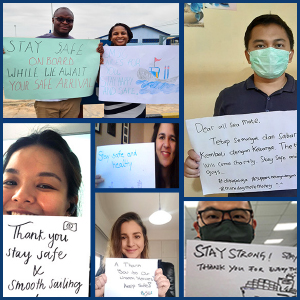Seafarer rotation has taken an unexpected and difficult turn because of the coronavirus outbreak, leading to hundreds of thousands of exhausted and frustrated workers in the maritime community, who are trapped on board vessels or at home. As the entire world grapples with the unprecedented COVID-19 crisis and its broad-reaching impacts, ship managers are dealing with the challenge of carrying out crew changes in a timely and efficient manner to ensure the health and safety of seafarers while supporting business continuity.
What used to be seamless routine work, done by shore personnel for seafarer colleagues, has become extremely complicated and cumbersome, almost like Tom Cruise’s ‘mission impossible’. When you contend with state-imposed lockdowns, flight cancellations, closed consulates, problematic schedules, and stringent protection requirements, a feeling of ‘mission impossible’ is not far-fetched.
To effect crew changes in today’s reality, ship managers need to take into account many factors that are beyond control – including crew nationality, port rotation, immigration requirements, and health protocols – and these factors vary per country and even per port, wherein some have more restrictions and others more unpredictability.
Given these limitations, crew changes between March and end April had to be suspended. This resulted not just in seafarers unable to leave ships but also colleagues who are significantly delayed in joining vessels. The accumulating backlog is taking a toll on shore employees as well, with their proven track record in ‘talking the talk and walking the walk’ when it comes to assisting their seafaring colleagues.
After months of hard work on the high seas, seafarers are eager to go home and immensely excited to be with their families and loved ones. But these colleagues find themselves having to agree, albeit reluctantly, to extend their employment contracts and remain at sea considerably longer than initially planned.
When crew changes are finally possible, constantly changing travel requirements in the different geographies often turn the journey home into an almost ridiculous odyssey. The same applies for new joiners who would like to relieve their colleagues on board but find themselves trapped at home for much longer than intended with no income or chance for career progression.
With more time passing but no real prospect of change, the situation is taking its toll on the overall morale of seafarers around the globe, impacting not only their safety aboard but also overall business continuity in the long run.
Communication is key
Uncertainties in crewing abound and will continue for the foreseeable future, even as ship managers are able to carry out effective but limited crew changes under special circumstances. Therefore, Bernhard Schulte Shipmagement’s (BSM) primary focus is to boost seafarer morale and take care of their overall wellbeing during these difficult times.
Since the COVID-19 outbreak, the Fleet Departments of BSM have been working closely with all seafarers presently deployed through vivid, transparent, and effective communication – key to managing the situation.
The communication is partly funnelled through stories and posts on our Seafarer Blog and Portal. With the proliferation of fake news and negative stories in social media and the internet in general, it is important to ensure accurate information and updates are available to our diligent seafarers.
Through BSM’s membership in the International Seafarers’ Welfare and Assistance Network (ISWAN), ship crews and their families can speak confidentially to a trained professional through a helpline that is available via multiple channels, including telephone, e-mail, WhatsApp, and live chat, 24 hours a day, 365 days a year, and with multilingual capabilities.
BSM’s customized work transcends to seafarers stranded ashore. Since the COVID-19 pandemic has made delayed joiners financially vulnerable, BSM has set up an initiative allowing them to apply for cash advances that can be repaid once they are onboard vessels.
Options for professional development are offered via online training and seminars. With almost no possibilities for traditional physical recruitment activity, BSM offers online processes and tools, such as the BSM Seafarer App.
Making mission impossible possible
Despite the rotation disruption wrought by the pandemic, BSM successfully facilitated movement for 14,208 ship crew in 73 countries and 425 ports as of 1 September, in strong partnership with our main port agency, Waypoint, and local authorities across the globe. Moreover, the BSM fleet continues to be COVID-19 free with extremely few exceptions, which can be attributed to the implementation of approved health procedures.
To this day, however, almost 3,000 BSM seafarers who already have completed their tours of duty are still waiting to be relieved. While the colleagues at shore are doing everything in their power to make repatriation happen, the ongoing pandemic is creating a different reality.
While several countries have made amends and designated seafarers as key workers, the situation remains complex. When designation only applies to nationals of a country, but restrictions still apply to seafarers from other countries, foreign crew is still unable to transit through that country for repatriation.
BSM supports the International Maritime Organization (IMO) and the International Labor Organization (ILO) in urging public and private sectors to recognize seafarers as ‘key workers’ to enable seafarer movements globally by relieving those who have extended their stay and be replaced with fresh crews. Only by having stranded seafarers relieved by fresh crews, will the industry be able to protect seafarers’ welfare, promote maritime safety, and ensure continued global trade.






